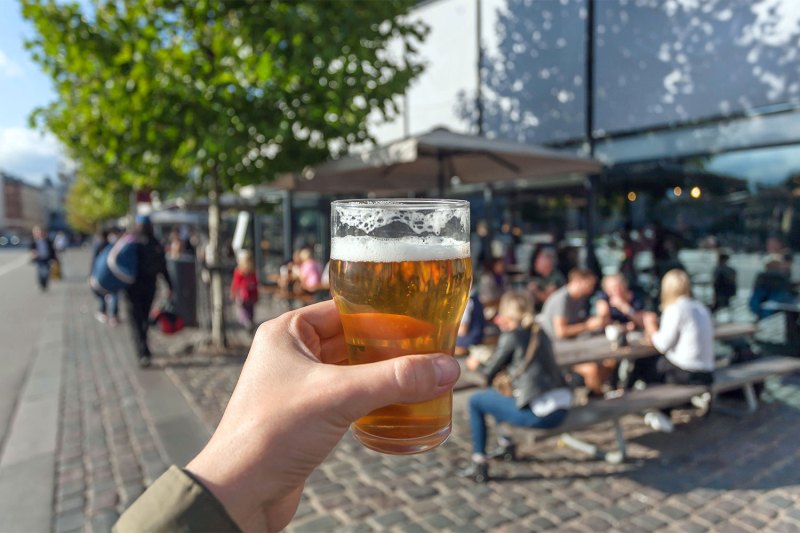Thanks to COVID-19, bar and restaurant closures have become a regular sight in cities and towns around the country. However, in many areas, local governments have chosen to suspend to-go cocktail bans, allowing hospitality businesses to stay open and giving patrons the chance to take their draft beers and margaritas and piña coladas on socially distant sidewalk strolls.
These to-go cocktail programs may be a temporary measure in most areas, but their success leads us to wonder why more cities don’t adopt permanent policies like the ones found in New Orleans, Las Vegas, Savannah, and Memphis, where open container laws don’t apply (at least, not in certain districts and neighborhoods). Are open container restrictions really necessary for public safety? Can’t businesses increase their revenues if they’re able to sell alcoholic beverages on a takeout basis, and won’t that help keep employees fairly compensated, even in the face of unforeseen circumstances? And honestly, what’s the problem with letting adult customers make their own decisions about where to enjoy their cocktail purchases (within reason, of course)?

We think that permanent loosenings or outright suspensions of open container laws are well overdue in the United States, for the following reasons.
The COVID crisis inspired many states and cities to alter their to-go laws for alcohol, resulting in greater revenue for businesses and satisfied clientele.
As previously mentioned, a number of U.S. cities with open container restrictions chose to adjust those limitations in the wake of the coronavirus crisis, allowing bars and restaurants to sell alcoholic drinks on a carryout and delivery basis. “COVID-19 has altered the policy reasons for keeping existing open container laws on the books. Since many local governments have now relaxed [their bans on] serving alcohol on-the-go, it may make sense to alter or repeal these laws,” argues NYC attorney David Reischer of LegalAdvice.com.
Christie Lawler, a Texas-based restaurant marketing consultant and the owner/founder of CJL Consulting, views a re-examination of open container laws as a move that will both please customers and also help to protect hospitality employees, who’ve found their livelihoods threatened as a result of COVID restaurant closures. “We have all worked so hard to change our business models to comply with the [coronavirus] situation to protect guests, consumers, and employees. But there is still work to be done. With our industry working on incredibly thin margins, we need every chance we can get to keep our workforce employed and earning a living wage. Things simply must change for us as we are incredibly vulnerable while also being intrinsically valuable as a mass employer, as well as a social outlet. If COVID has taught us anything, it’s that restaurants matter – and, more importantly, the people of this industry matter,” Lawler tells us.
The rationales behind open container restrictions don’t always line up with reality.
The reasoning behind open container laws can seem a bit arbitrary to most people … and that’s because it is a bit arbitrary. In some states, open container laws date back to Prohibition and remain in use out of habit more than anything else. And in other states, like Texas, lawmakers justify strict open container policies using logic that might sound reasonable at first glance, but that operates around a lot of assumptions. “Texas open container laws are confusing, even for locals, because of overlapping county and municipal jurisdictions. Statewide laws regarding open containers in vehicles ignore actual impairment, if any. Both types of laws serve as an excuse for law enforcement to stop and investigate citizens who may not be committing any other crime or be causing any problems. One way to make the laws better serve citizens would be to establish uniform laws, but this would eliminate the ability for local governments to create ordinances tailored to the needs of their communities. So, a better option would be to eliminate open container laws and enforce existing laws against Public Intoxication (prohibiting intoxicated persons in public who are a danger to themselves or others), Disorderly Conduct, or Driving While Intoxicated, and similar offenses. That would allow law enforcement to address problems without criminalizing conduct that isn’t inherently dangerous or offensive,” explains San Antonio attorney Joseph Hoelscher, who specializes in laws involving the Texas Alcoholic Beverage Commission.
Texas, like many other states, didn’t come around to the sale of pre-mixed to-go cocktails until very recently, and co-owner Justin Lavenue of The Roosevelt Room in Austin thinks that the state’s initial insistence on hewing to its usual open container restrictions even in the midst of the pandemic didn’t ultimately serve either businesses or local residents. “The governor was convinced that the sale of pre-mixed cocktails to-go would encourage people to drink them in their cars, therefore increasing the rate of drunk driving. This doesn’t make sense because people already have the ability to buy wine, beer, or liquor at the liquor or grocery store and [can therefore] do the same thing. The only way these laws would change is if the state would realize how much an adjustment of open container laws and the legalization of pre-mixed cocktails would help local, smaller, independent businesses,” says Lavenue, who is admittedly wary of Texas’ late-breaking choice to allow some bars to sell pre-mixed cocktails (apparently, the Texas governor did approve pre-mixed cocktails earlier in the spring, only to instantly rescind his decision, so bartenders in the Lone Star State are concerned about history repeating).
For CEO and co-founder Tim Obert of Seven Stills Distillery in San Francisco, open container bans in his area put an unfair burden of responsibility on on-site bartenders and increase the odds of patrons overindulging on premises: “Adding constraints to when and where people can drink alcohol [creates] a general stigma, which may cause people to over drink when they are at an establishment that serves alcohol. For us, the concern needs to remain on the safety of the general public ensuring that any action of enjoying alcohol doesn’t negatively affect other people.”

For a suspension of open container restrictions to work, local governments and business operators will need to collaborate to ensure public safety and to reduce littering.
By endorsing widespread suspensions of open container laws, we’re by no means proposing a The Purge-esque lack of accountability or consequences for dangerous and disruptive behaviors. For these lax policies to work effectively, restaurant and bar owners and managers must be in solid communication with their local governments to formulate and uphold standards of safety and cleanliness related to the sales of to-go alcoholic beverages.
According to co-owner and managing partner Jake Poznak of Moonrise Izakaya in NYC (which has sold to-go cocktails throughout the pandemic closures), “for local governments with strict open container laws to change their minds, they would need [to see the following]. First, bars and restaurants would have to be as strict about serving to-go cocktails as they [are] with serving drinks at the bar. Next, a set of guidelines and laws including reprimands and fines for unruly customer behavior (i.e. public intoxication, public urination, etc.) [would need to be put in place.] Finally, especially in this economy, when so many bars and restaurants have shuttered either permanently or temporarily, local governments will need to see a beneficial budget effect on their end. They lost a major amount of budget from the lack of sales tax collected during COVID-19 when businesses were closed, so [revising open container laws] would boost sales and, in turn, increase sales tax, thus helping local & state economies.”
Co-owner Robert Wiley of Deviation Distilling in Denver, Colorado points out that, in his area, certain permitted events and festivals get the okay from the local government to serve alcohol on the streets from time to time, and that cities should look to the success rate of these events when determining whether to suspend open container restrictions across the board. “As a craft distillery in the Arts District of Denver, I see the upside of allowing individuals to walk the streets during First Fridays (a monthly event where art galleries stay open late) and during arts festivals, enjoying the community art while consuming drinks. As a distillery owner with a cocktail lounge in a more industrial area of Denver with less foot traffic than other areas, permitting open containers would not have a positive or negative impact on our business. However, [in] areas where there are multiple businesses, retailers, restaurants, and public spaces, [bars] may benefit more [from these policies].” He goes on to say that “I tend to break down the public consumption of alcohol into two categories: Social consumption and events/festivals. The laws [tend to] focus on the former, while events & festivals have boundaries and structures in place. For responsible social consumption, local areas would need a [festival-like] plan in place for safety and for cleanliness/waste.”
For his part, attorney David Reischer does believe that, while open container laws should be abolished on a larger scale, there’s still a place for laws that specifically pertain to open containers in vehicles. “Open container laws that prohibit such open containers of alcoholic beverages in vehicles still make a lot of sense, especially in major metropolises with lots of cars. Each locality will need to determine the wisdom of altering or completely repealing such laws and the potential effect on drinking and driving. Still, many of these open container laws are not necessary in small, walkable cities throughout America,” he tells us.
In cities that don’t have open container laws, the ability for guests to carry their drinks on the sidewalk is a win-win for businesses and customers alike.
American cities without open container laws aren’t a pie-in-the-sky idea; they actually exist in several regions of the nation, and there’s possibly no more famous example than the Big Easy. The city of New Orleans allows people to enjoy to-go alcoholic drinks throughout the historic French Quarter, and creative director Alan Walter of Loa Bar in New Orleans tells us that the open container freedom in his city is a net positive for everyone involved. “This convenience allows residents to support local businesses, but to consume a cocktail at home or at their preferred destination. It is a convenience that I have found residents utilize responsibly,” he says.
Walter views to-go cocktails as a profitable business venture for bars in walkable neighborhoods, stating that “the ability to sell takeout cocktails is financially beneficial for many establishments. Guests opting to take their cocktails to-go are still supporting a local business, but [they’re] also [opening up more] physical space for additional guests who wish to stay and savor their drink within the bar.”



